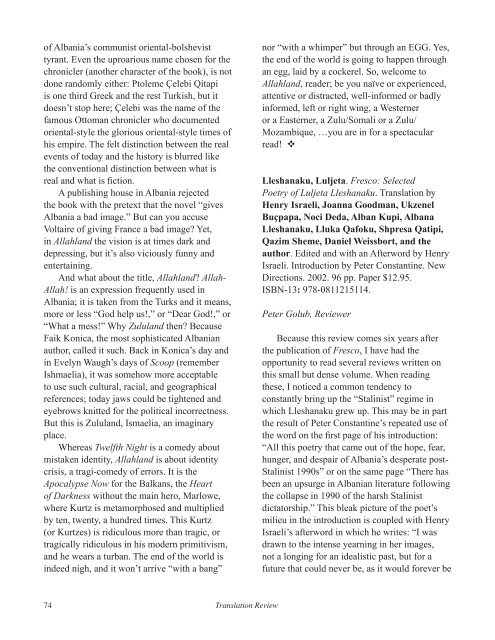Table of contents - The University of Texas at Dallas
Table of contents - The University of Texas at Dallas
Table of contents - The University of Texas at Dallas
You also want an ePaper? Increase the reach of your titles
YUMPU automatically turns print PDFs into web optimized ePapers that Google loves.
<strong>of</strong> Albania’s communist oriental-bolshevist<br />
tyrant. Even the uproarious name chosen for the<br />
chronicler (another character <strong>of</strong> the book), is not<br />
done randomly either: Ptoleme Çelebi Qitapi<br />
is one third Greek and the rest Turkish, but it<br />
doesn’t stop here; Çelebi was the name <strong>of</strong> the<br />
famous Ottoman chronicler who documented<br />
oriental-style the glorious oriental-style times <strong>of</strong><br />
his empire. <strong>The</strong> felt distinction between the real<br />
events <strong>of</strong> today and the history is blurred like<br />
the conventional distinction between wh<strong>at</strong> is<br />
real and wh<strong>at</strong> is fiction.<br />
A publishing house in Albania rejected<br />
the book with the pretext th<strong>at</strong> the novel “gives<br />
Albania a bad image.” But can you accuse<br />
Voltaire <strong>of</strong> giving France a bad image Yet,<br />
in Allahland the vision is <strong>at</strong> times dark and<br />
depressing, but it’s also viciously funny and<br />
entertaining.<br />
And wh<strong>at</strong> about the title, Allahland Allah-<br />
Allah! is an expression frequently used in<br />
Albania; it is taken from the Turks and it means,<br />
more or less “God help us!,” or “Dear God!,” or<br />
“Wh<strong>at</strong> a mess!” Why Zululand then Because<br />
Faik Konica, the most sophistic<strong>at</strong>ed Albanian<br />
author, called it such. Back in Konica’s day and<br />
in Evelyn Waugh’s days <strong>of</strong> Scoop (remember<br />
Ishmaelia), it was somehow more acceptable<br />
to use such cultural, racial, and geographical<br />
references; today jaws could be tightened and<br />
eyebrows knitted for the political incorrectness.<br />
But this is Zululand, Ismaelia, an imaginary<br />
place.<br />
Whereas Twelfth Night is a comedy about<br />
mistaken identity, Allahland is about identity<br />
crisis, a tragi-comedy <strong>of</strong> errors. It is the<br />
Apocalypse Now for the Balkans, the Heart<br />
<strong>of</strong> Darkness without the main hero, Marlowe,<br />
where Kurtz is metamorphosed and multiplied<br />
by ten, twenty, a hundred times. This Kurtz<br />
(or Kurtzes) is ridiculous more than tragic, or<br />
tragically ridiculous in his modern primitivism,<br />
and he wears a turban. <strong>The</strong> end <strong>of</strong> the world is<br />
indeed nigh, and it won’t arrive “with a bang”<br />
nor “with a whimper” but through an EGG. Yes,<br />
the end <strong>of</strong> the world is going to happen through<br />
an egg, laid by a cockerel. So, welcome to<br />
Allahland, reader; be you naïve or experienced,<br />
<strong>at</strong>tentive or distracted, well-informed or badly<br />
informed, left or right wing, a Westerner<br />
or a Easterner, a Zulu/Somali or a Zulu/<br />
Mozambique, …you are in for a spectacular<br />
read! v<br />
Lleshanaku, Luljeta. Fresco: Selected<br />
Poetry <strong>of</strong> Luljeta Lleshanaku. Transl<strong>at</strong>ion by<br />
Henry Israeli, Joanna Goodman, Ukzenel<br />
Buçpapa, Noci Deda, Alban Kupi, Albana<br />
Lleshanaku, Lluka Qafoku, Shpresa Q<strong>at</strong>ipi,<br />
Qazim Sheme, Daniel Weissbort, and the<br />
author. Edited and with an Afterword by Henry<br />
Israeli. Introduction by Peter Constantine. New<br />
Directions. 2002. 96 pp. Paper $12.95.<br />
ISBN-13: 978-0811215114.<br />
Peter Golub, Reviewer<br />
Because this review comes six years after<br />
the public<strong>at</strong>ion <strong>of</strong> Fresco, I have had the<br />
opportunity to read several reviews written on<br />
this small but dense volume. When reading<br />
these, I noticed a common tendency to<br />
constantly bring up the “Stalinist” regime in<br />
which Lleshanaku grew up. This may be in part<br />
the result <strong>of</strong> Peter Constantine’s repe<strong>at</strong>ed use <strong>of</strong><br />
the word on the first page <strong>of</strong> his introduction:<br />
“All this poetry th<strong>at</strong> came out <strong>of</strong> the hope, fear,<br />
hunger, and despair <strong>of</strong> Albania’s desper<strong>at</strong>e post-<br />
Stalinist 1990s” or on the same page “<strong>The</strong>re has<br />
been an upsurge in Albanian liter<strong>at</strong>ure following<br />
the collapse in 1990 <strong>of</strong> the harsh Stalinist<br />
dict<strong>at</strong>orship.” This bleak picture <strong>of</strong> the poet’s<br />
milieu in the introduction is coupled with Henry<br />
Israeli’s afterword in which he writes: “I was<br />
drawn to the intense yearning in her images,<br />
not a longing for an idealistic past, but for a<br />
future th<strong>at</strong> could never be, as it would forever be<br />
74 Transl<strong>at</strong>ion Review

















